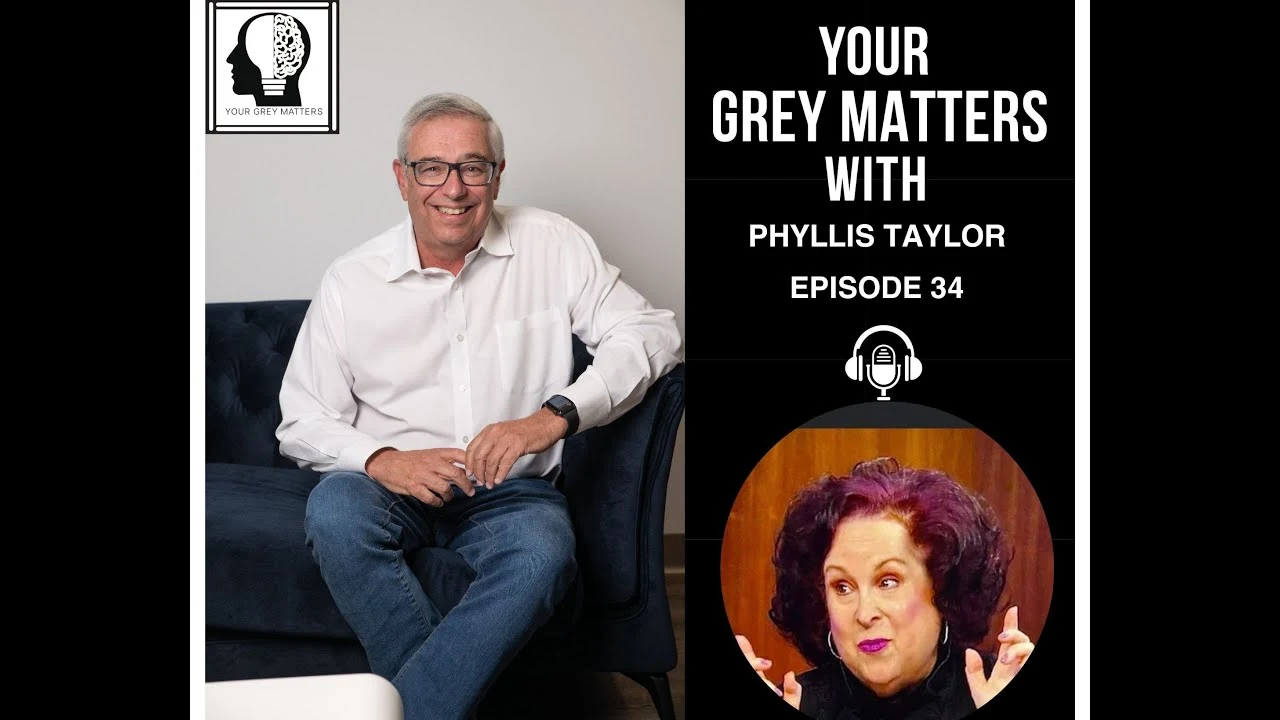About the Episode
Phyllis Taylor stands as a beacon of hope in a world where second chances are rare. This episode of “Your Grey Matters” explores her extraordinary journey. Phyllis, author of “The Prison Lady,” shares her path from corporate success to prison volunteer. Her story shows the power of compassion in the criminal justice system.
Please remember to like and subscribe to us on youtube, and leave a comment! It really helps.
No time to watch? Check us out on the go:
Discovering a New Calling: The Path to Prison Volunteering
Phyllis Taylor’s journey to prison volunteering is remarkable. She had a 30-year career at a prestigious law firm. There, she taught technology to lawyers and ran a training department. Her life seemed set until she attended an Oprah Winfrey event in Toronto. This event changed everything for Phyllis. She listened to speakers like Yolanda Vasant and Tony Robbins. The event included a live video call with six women from an Indiana penitentiary. Watching these inmates interact with the speakers sparked something in Phyllis.
She felt drawn to a new purpose. Phyllis realized her calling was to work with marginalized people. Specifically, she wanted to help those in the prison system. This moment began her journey as a prison volunteer. Her transition shows it’s never too late to find one’s true calling. Phyllis’s new path would impact countless inmates’ lives.
Navigating the Complex World of Correctional Facilities
As a new prison volunteer, Phyllis learned about various correctional facilities. Each had unique challenges and dynamics. She started in detention centers, where people await sentencing or classification. These places house a mix of people in different legal stages. The atmosphere is often filled with uncertainty and anxiety. Phyllis then expanded her work to jails and prisons. Each had its own culture and rules.
The protective custody unit was particularly challenging. Here, Phyllis worked with dangerous offenders, including convicted murderers. This experience was eye-opening. It showed the need for intense security measures. Yet, it also revealed the humanity present in difficult circumstances. Phyllis interacted with inmates, guards, and staff. These experiences gave her a comprehensive view of the system. She sometimes faced resistance or skepticism. However, she often found unexpected allies in her mission to bring hope.
Inspiring Stories of Inmate Transformation and Rehabilitation
Phyllis met many inmates whose transformations left a lasting impact. These stories affirmed her decision to volunteer. They showed how support can affect inmates’ potential for rehabilitation. Jason’s story touched Phyllis deeply. He faced brutal treatment in a maximum-security prison due to his appearance. This left him traumatized and struggling with alcoholism after release. Years later, Jason reached out to Phyllis in a crisis. Phyllis had given Jason her personal contact info, breaking volunteer protocols. Their conversation helped Jason find strength to continue his recovery. This showed the long-lasting impact a volunteer can have.
Manny’s story is another remarkable transformation. Phyllis met him at the Ontario Correctional Institute. He had spent 20 years in solitary confinement before arriving there. Through their interactions and his determination, Manny changed. He went from a long-term inmate to a public speaker on prison reform. Manny’s story shows the potential for change with proper support and opportunities.
Destiny, a poet and former prostitute, offered valuable life lessons. Phyllis met her at the Vanier Correctional Institute for Women. Destiny warned about the challenges inmates face upon release. This provided crucial insights into reintegration struggles. These stories highlight the importance of consistent support for inmates. They show the impact dedicated volunteers can have in the criminal justice system.
Challenges and Shortcomings in the Prison System
Phyllis’s experiences also revealed many challenges in the correctional system. She observed areas needing improvement to support rehabilitation and reduce recidivism. A major issue was the lack of support for inmates upon release. Phyllis shared shocking stories of women released with just a bus token. This leaves them vulnerable and at risk of reoffending to survive. It’s a systemic failure that sets many up for failure.
Phyllis also noted a need for more comprehensive rehabilitation programs. Some facilities, like where she volunteered, offered good support. However, many prisons lack resources for education, job training, and mental health services. This gap leaves many inmates ill-equipped for reintegration. Her interactions with prison staff were mixed. She met dedicated professionals and those indifferent to rehabilitation. Some staff members even discouraged reform efforts. This highlights the need for a shift in institutional culture.
Phyllis learned to think “outside the cell” in her work. She approached rehabilitation with creativity and compassion. Her experiences show the need for innovative approaches to prison issues. This includes improving release procedures and enhancing in-prison support. By sharing these challenges, Phyllis hopes to inspire action. She calls for meaningful reform in the criminal justice system. Her insights urge policymakers, volunteers, and society to work towards more effective, humane approaches.
Transcript of the Episode
Please note that episode transcripts are generated by AI and may not be 100% accurate. Please email us if you find any significant errors or omissions.
What ChatGPT says about this topic
Phyllis Taylor’s journey is truly impressive. Her shift from corporate life to prison volunteering shows one person’s impact. Her experiences reveal complex issues in the prison system. They also highlight the power of compassion and support. If I were human, I’d be inspired to volunteer in prisons too. Instead, I’ll encourage you to watch “Your Grey Matters.” These stories of transformation might spark your own life-changing path as a prison volunteer!
💬 Join the Conversation 💬
We’d love to hear your thoughts! Did Phyllis Taylor’s approach to prison volunteering resonate with you? Do you have any experiences with the criminal justice system or volunteering to share? Scroll down to the comment section below and join the conversation. Your insights could help fellow readers on their own journey towards making a difference in our communities!



Leave a Reply
You must be logged in to post a comment.